大学英语四级基础复习讲义.pdf
大学英语四级复习资料·整理版
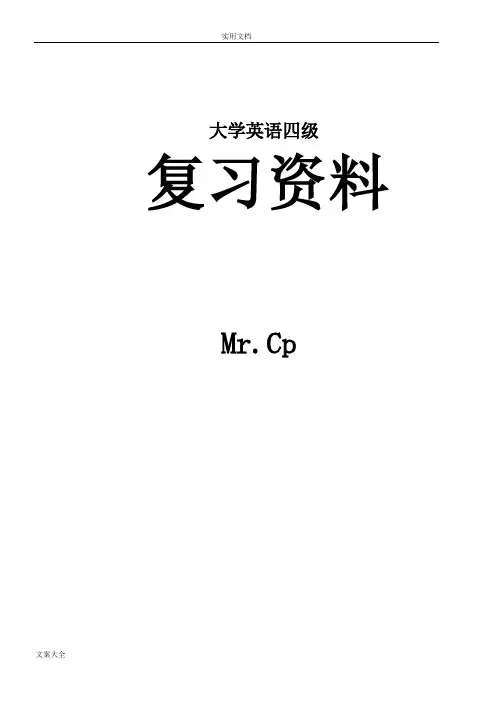
实用文档文案大全大学英语四级复习资料 Mr.Cp滴水渐累成沧海,拳石频移成泰山祝大家顺利过级目录第一部分.听力部分 (2)第二部分.最新英语四级高频词汇 (23)第三部分.四级阅读笔记 (31)第四部分.完形填空做题技巧 (36)第五部分.翻译经典练习 (38).第六部分.写作七类精彩句型 (40)第七部分.写作必备模板和句型 (42)第八部分.综合技能训练 (45)第九部分.作文训练 (73)第十部分.英语谚语警句 (85)资料说明:本复习资料非教材用书。
复习资料主要收集了四级听力、阅读、词汇、作文等一些英语四级相关的技巧、方法和内容,主要提供给有需要考四级的同学自己复习所用。
1滴水渐累成沧海,拳石频移成泰山祝大家顺利过级第一部分.听力部分一、听力内容1.Section A 对话短对话 (5分02秒) 8个对话: 4分12秒长对话 (5分58秒)Conversation 1 (4 questions):对话内容(1分45秒)+问题(1分25秒)Conversation 2 (3 questions):对话内容(1分45秒)+问题(1分02秒)2.Section B 短文(10分05秒)Directions: 35秒Passage 1 (3 questions):文章内容(1分25秒)+问题(1分10秒)Passage 2 (3 questions):文章内容(2分25秒)+问题(1分10秒)Passage 3 (4 questions):文章内容(1分45秒)+问题(1分55秒)3.Section C 复合式听写 (11分20秒)Directions: 45秒第一遍: 2分10秒第二遍:第一句停顿:1分05秒第二句停顿:1分35秒第三句停顿:1分15秒第三遍:2分10秒(以上时间根据文章内容会有所变化)二、听力技巧四级听力一直困扰着我们每一位考生,听不懂磁带中的内容是什么,不知道该如何选择,而听力在英语四级考试中又占很大一部分比重,掌握好英语四级听力技巧才能快速提高英语成绩,以下总结出几点有关英语四级听力技巧。
全国大学英语四级考试复习资料
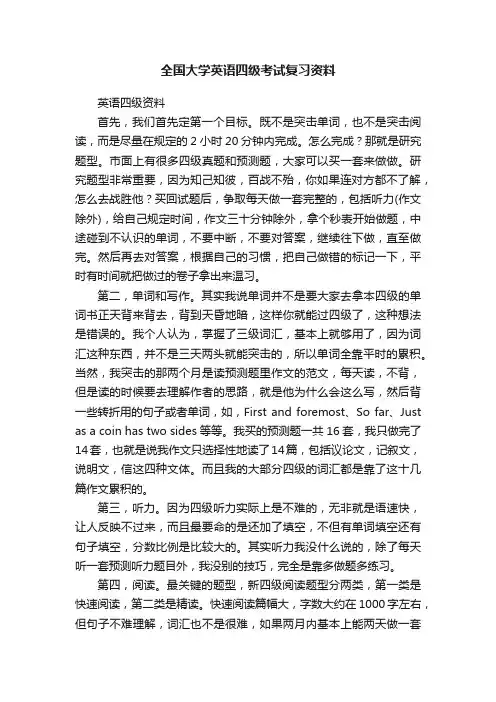
全国大学英语四级考试复习资料英语四级资料首先,我们首先定第一个目标。
既不是突击单词,也不是突击阅读,而是尽量在规定的2小时20分钟内完成。
怎么完成?那就是研究题型。
市面上有很多四级真题和预测题,大家可以买一套来做做。
研究题型非常重要,因为知己知彼,百战不殆,你如果连对方都不了解,怎么去战胜他?买回试题后,争取每天做一套完整的,包括听力(作文除外),给自己规定时间,作文三十分钟除外,拿个秒表开始做题,中途碰到不认识的单词,不要中断,不要对答案,继续往下做,直至做完。
然后再去对答案,根据自己的习惯,把自己做错的标记一下,平时有时间就把做过的卷子拿出来温习。
第二,单词和写作。
其实我说单词并不是要大家去拿本四级的单词书正天背来背去,背到天昏地暗,这样你就能过四级了,这种想法是错误的。
我个人认为,掌握了三级词汇,基本上就够用了,因为词汇这种东西,并不是三天两头就能突击的,所以单词全靠平时的累积。
当然,我突击的那两个月是读预测题里作文的范文,每天读,不背,但是读的时候要去理解作者的思路,就是他为什么会这么写,然后背一些转折用的句子或者单词,如,First and foremost、So far、Just as a coin has two sides等等。
我买的预测题一共16套,我只做完了14套,也就是说我作文只选择性地读了14篇,包括议论文,记叙文,说明文,信这四种文体。
而且我的大部分四级的词汇都是靠了这十几篇作文累积的。
第三,听力。
因为四级听力实际上是不难的,无非就是语速快,让人反映不过来,而且最要命的是还加了填空,不但有单词填空还有句子填空,分数比例是比较大的。
其实听力我没什么说的,除了每天听一套预测听力题目外,我没别的技巧,完全是靠多做题多练习。
第四,阅读。
最关键的题型,新四级阅读题型分两类,第一类是快速阅读,第二类是精读。
快速阅读篇幅大,字数大约在1000字左右,但句子不难理解,词汇也不是很难,如果两月内基本上能两天做一套题目的话,拿下快速阅读是很容易的。
四级基础讲义打印
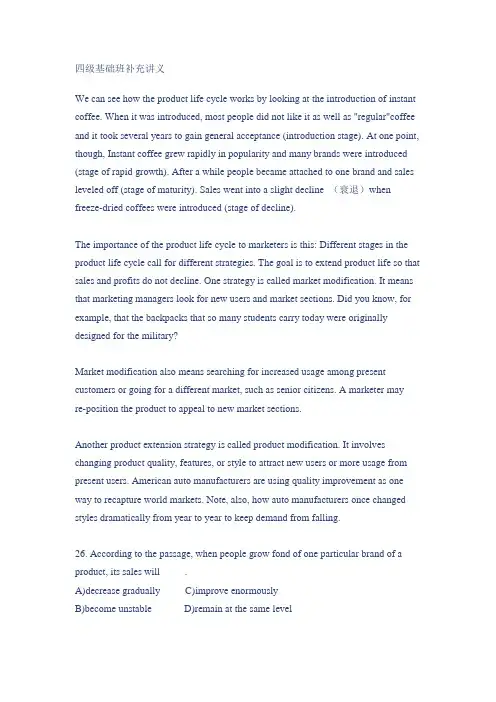
四级基础班补充讲义We can see how the product life cycle works by looking at the introduction of instant coffee. When it was introduced, most people did not like it as well as "regular"coffee and it took several years to gain general acceptance (introduction stage). At one point, though, Instant coffee grew rapidly in popularity and many brands were introduced (stage of rapid growth). After a while people became attached to one brand and sales leveled off (stage of maturity). Sales went into a slight decline (衰退)when freeze-dried coffees were introduced (stage of decline).The importance of the product life cycle to marketers is this: Different stages in the product life cycle call for different strategies. The goal is to extend product life so that sales and profits do not decline. One strategy is called market modification. It means that marketing managers look for new users and market sections. Did you know, for example, that the backpacks that so many students carry today were originally designed for the military?Market modification also means searching for increased usage among present customers or going for a different market, such as senior citizens. A marketer mayre-position the product to appeal to new market sections.Another product extension strategy is called product modification. It involves changing product quality, features, or style to attract new users or more usage from present users. American auto manufacturers are using quality improvement as one way to recapture world markets. Note, also, how auto manufacturers once changed styles dramatically from year to year to keep demand from falling.26. According to the passage, when people grow fond of one particular brand of a product, its sales will ____ .A)decrease gradually C)improve enormouslyB)become unstable D)remain at the same level27. The first paragraph tells us that a new product is _____ .A)usually introduced to satisfy different tastesB)often more expensive than old onesC)often inferior to old ones at firstD)not easily accepted by the public28. Marketers need to know which of the four stages a product is in so as to__________ .A)work out marketing policies C)promote its productionB)increase its popularity D)speed up its life cycle29. The author mentions the example of "backpacks"(Line 4, Para.2 ) to show the importance of _______ .A)increasing usage among students C)pleasing the young as well as the oldB)exploring new market sections D)serving both military and civil needs30. In order to recover their share of the world market, U.S. auto makers are_______ .A)improving product quality C)re-positioning their product in the marketB)modernizing product style D)increasing product featuresIt is pretty much a one-way street. While it may be common for university researchers to try their luck in the commercial world, there is very little traffic in the opposite direction. Pay has always been the biggest deterrent, as people with families often feel they cannot afford the drop in salary when moving to a university job. For some industrial scientists, however, the attractions of academia (学术界) outweigh any financial considerations.Helen Lee took a 70% cut in salary when she moved from a senior post in Abbott Laboratories to a medical department at the University of Cambridge. Her main reason for returning to academia mid-career was to take advantage of the greater freedom to choose research questions. Some areas of inquiry have few prospects of a commercial return, and Lee’s is one of them.The impact of a salary cut is probably less severe for a scientist in the early stages of a career. Guy Grant, now a research associate at the Unilever Centre for Molecular Informatics at the University of Cambridge, spent two years working for a pharmaceutical(制药的) company before returning to university as a post-doctoral researcher. He took a 30% salary cut but felt it worthwhile for the greater intellectual opportunities.Higher up the ladder, where a pay cut is usually more significant, the demand for scientists with a wealth of experience in industry is forcing universities to make the transition (转换) to academia more attractive, according to Lee. Industrial scientists tend to receive training that academics do not, such as how to build a multidisciplinary team, manage budgets and negotiate contracts. They are also well placed to bring something extra to the teaching side of an academic role that will help students get a job when they graduate, says Lee, perhaps experience in manufacturing practice or product development. “Only a small number of undergraduates will continue in an academic career. So someone leaving university who already has the skills needed to work in an industrial lab has far more potential in the job market than someone who has spent all their time on a narrow research project.”57. By “a one-way street” (Line 1, Para. 1), the author means ________.[A] university researchers know little about the commercial world[B] there is little exchange between industry and academia[C] few industrial scientists would quit to work in a university[D] few university professors are willing to do industrial research58. The word “deterrent” (Line 2, Para. 1) most probably refers to something that________.[A] keeps someone from ta king action [C] attracts people’s attention[B] helps to move the traffic [D] brings someone a financial burden59. What was Helen Lee’s major consideration when she changed her job in the middle of her career?[A] Flexible work hours. [C] Her preference for the lifestyle on campus.[B] Her research interests. [D] Prospects of academic accomplishments.60. Guy Grant chose to work as a researcher at Cambridge in order to ________.[A] do financially more rewarding work[B] raise his status in the academic world[C] enrich his experience in medical research[D] exploit better intellectual opportunities61. What contribution can industrial scientists make when they come to teach in a university?[A] Increase its graduates’ competitiveness in the job market.[B] Develop its students’ potential in research.[C] Help it to obtain financial support from industry.[D] Gear its research towards practical applications.Questions 26 to 30 are based on the following passage.It came as something of a surprise when Diana, Princess of Wales, made a trip to Angola in 1997, to support the Red Cross‟s campaign for a total ban on all anti-personnel landmines. Within hours of arriving in Angola, television screens around the World were filled with images of her comforting victims injured in explosions caused by landmines. “I knew the statistics,” she said.“But putting a face to those figures brought the reality home to me; like When I met Sandra, a 13-year-old girl who had lost her leg, and people lik e her.”The Princess concluded, with a simple message: “We must stop landmines”. And she used every opportunity during her visit to repeat this message.But, back in London, her views were not shared by some members of the British government, which refused to support a ban on these weapons. Angry politicians launched an, attack on the Princess in the press. They described her as “very ill-informed”and a “loose cannon (乱放炮的人).”The Princess responded by brushing aside the criticisms: “This is a distraction (干扰) we do not need. All I‟m trying to do is help.”Opposition parties, the media and the Public immediately voiced their support for the Princess. To make matters wo rse for the government, it soon emerged that the Princess‟s trip had been approved by the Foreign Office, and that she was in fact very well-informed about both the situation in Angola and the British government‟s policy regarding landmines. The result was a severe embarrassment for the government.To try and limit the damage, the Foreign Secretary, Malcolm Rifkind, claimed that the Princess‟s views on landmines were not very different from government policy, and that it was “working towards” a worldwide ba n. The Defense Secretary, Michael Portillo, claimed the matter was “a misinterpretation or misunderstanding.”For the Princess, the trip to this war-torn country was an excellent opportunity to use her popularity to show the world how much destruction and suffering landmines can cause. She said that the experience had also given her the Chance to get closer to people and their problems.26. Princess Diana paid a visit to Angola in 1997 ________.A) to voice her support for a total ban of landminesB) to cla rify the British government‟s stand on landminesC) to investigate the sufferings of landmine victims thereD) to establish her image as a friend of landmine victims27. What did Diana mean when she said “... putting a face to those figures brought thereality home to me” (Line 5, Para. 1)?A) She just couldn‟t bear to meet the landmine victims face to face.B) The actual situation in Angola made her feel like going back home.C) Meeting the landmine victims in person made her believe the statistics.D) Seeing the pain of the victims made her realize the seriousness of the situation.28. Some members of the British government criticized Diana because ________.A) she was ill-informed of the government‟s policyB) they were actually opposed to banning landminesC) she had not consulted the government before the visitD) they believed that she had misinterpreted the situation in Angola29. How did Diana respond to the criticisms?A) She paid no attention to them.B) She made more appearances on TV.C) She met the 13-year-old girl as planned.D) She rose to argue with her opponents.30. What did Princess Diana think of her visit to Angola?A) It had caused embarrassment to the British government.B) It had brought her closer to the ordinary people.C) It had greatly promoted her popularity.D) It had affected her relations with the British government.“Tear…em apart!” “Kill the fool!” “Murder the referee (裁判)!”These are common remarks one may hear at various sporting events. At the time they are made, they may seem innocent enough. But let‟s not kid ourselves. They have been known to influence behavior in such a way as to lead to real bloodshed. Volumes have been written about the way words affect us. It has been shown that words having certain connotations (含义) may cause us to react in ways quite foreign to what we consider to be our usual humanistic behavior. I see the term “opponent” as one of those words. Perhaps the time has come to delete it from sports terms.The dictionary meaning of the term “opponent “is “adversary “: “enemy “; “one who opposes your interests.” “Thus, when a player meets an opponent, he or she may tend to treat that opponent as an enemy. At such times, winning may dominate one‟s intellect, and every action, no matter how gross, may be considered justifiable. I recall an incident in a handball game when a referee refused a player‟s request for a time out for a glove change because he did not considered then wet enough. The player proceeded to rub his gloves across his wet T-shirt and then exclaimed. “Are they wet enough now?”In the heat of battle, players have been observed to throw themselves across the court without considering the consequences that such a move might have on anyone in their way. I have also witnessed a player reacting to his opponent‟s international and illegal blocking by deliberately hitting him with the ball as hard as he could during the course of play. Off the court, they are good friends. Does that make any sense? It certainly gives proof of a court attitude which departs from normal behavior.Therefore, I believe it is time we elevated (提升) the game to the level where it belongs thereby setting an example to the rest of the sporting world. Replacing the term “opponent” with “associate” could be an ideal way to start.The dictionary meaning of the term “associate” is “colleague”; “friend”; “companion.” Reflect a moment! You may soon see and possibly feel the difference in your reaction to theterm “associate” rather than “opponent.”26. Which of the following statements best expresses the author‟s view?A) Aggressive behavior in sports can have serious consequences.B) The words people use can influence their behavior.C) Unpleasant words in sports are often used by foreign athletes.D) Unfair judgments by referees will lead to violence on the sports field.27. Harsh words are spoken during games because the players ________.A) are too eager to winB) are usually short-tempered and easily offendedC) cannot afford to be polite in fierce competitionD) treat their rivals as enemies28. What did the handball player do when he was not allowed a time out to change hisgloves?A) He refused to continue the game.B) He angrily hit the referee with a ball.C) He claimed that the referee was unfair.D) He wet his gloves by rubbing them across his T-shirt.29. According to the passage, players, in a game, may ________.A) deliberately throw the ball at anyone illegally blocking their wayB) keep on screaming and shouting throughout the gameC) lie down on the ground as an act of protestD) kick the ball across the court with force30. The author hopes to have the current situation in sports improved by ________.A) calling on players to use clean language on the courtB) raising the referee‟s sense of responsibilityC) changing the attitude of players on the sports fieldD) regulating the relationship between players and referees。
大学英语四级讲义readingindepth
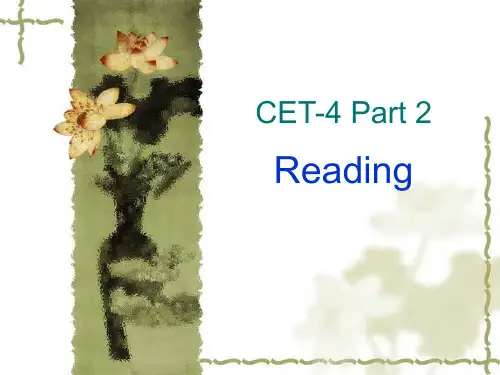
主旨大意题 解题技巧
(1)所选的选项应能概括全文的中心思想,不 能只是概括某一段或某几段的主题的选项。 (2)所选的选项应准确,即:不能有任何违背 原文的地方。 (3)尽量避免选择有绝对词的选项。 如all, completely, only, almost, absolutely, definitely等 (4)仔细比较意义相近的选项中词义的细微差 别。
Some students prefer a strict teacher who tells them exactly what to do. Others prefer to be left to work on their own. Still others like a democratic discussion type of class. Not one teaching method can be devised to satisfy all students at the same time.
For adults a cold is not that serious. However, this is not the case for children. Cold symptoms in children may be signs of more serious diseases and should be given prompt medical attention.
细节事实题 命题规律
(3)(指示)代词出现处常考 这类考题,常用来考查考生是否真正理解 上下文之间的句际关系和意义。 (4)引用人物论断处常考 作者为正确表达自己观点或使论点更有依 据,常会引用某些权威人士的论断或采纳其重 要发现等。命题者常在此处做文章。
大学英语四级专业辅导资料
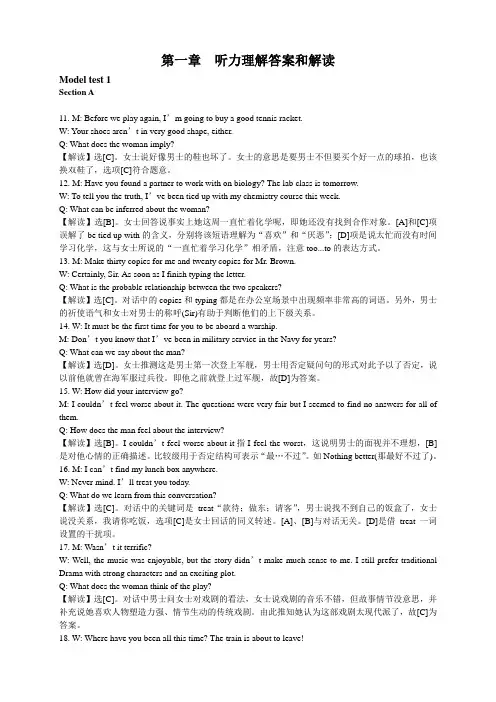
第一章听力理解答案和解读Model test 1Section A11. M: Before we play again, I’m going to buy a good tennis racket.W: Your shoes aren’t in very good shape, either.Q: What does the woman imply?【解读】选[C]。
女士说好像男士的鞋也坏了。
女士的意思是要男士不但要买个好一点的球拍,也该换双鞋了,选项[C]符合题意。
12. M: Have you found a partner to work with on biology? The lab class is tomorrow.W: To tell you the truth, I’ve been tied up with my chemistry course this week.Q: What can be inferred about the woman?【解读】选[B]。
女士回答说事实上她这周一直忙着化学呢,即她还没有找到合作对象。
[A]和[C]项误解了be tied up with的含义,分别将该短语理解为“喜欢”和“厌恶”;[D]项是说太忙而没有时间学习化学,这与女士所说的“一直忙着学习化学”相矛盾,注意too...to的表达方式。
13. M: Make thirty copies for me and twenty copies for Mr. Brown.W: Certainly, Sir. As soon as I finish typing the letter.Q: What is the probable relationship between the two speakers?【解读】选[C]。
对话中的copies和typing都是在办公室场景中出现频率非常高的词语。
2020英语四级全课程讲义
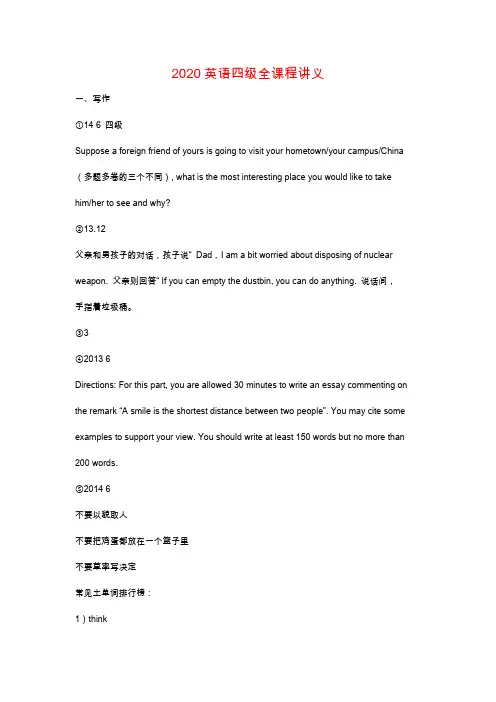
2020英语四级全课程讲义一、写作①14 6 四级Suppose a foreign friend of yours is going to visit your hometown/your campus/China (多题多卷的三个不同), what is the most interesting place you would like to take him/her to see and why?②13.12父亲和男孩子的对话,孩子说“Dad,I am a bit worried about disposing of nuclear weapon. 父亲则回答“ If you can empty the dustbin, you can do anything. 说话间,手指着垃圾桶。
③3④2013 6Directions: For this part, you are allowed 30 minutes to write an essay commenting on the remark “A smile is the shortest distance between two people”. You may cite some examples to support your view. You should write at least 150 words but no more than 200 words.⑤2014 6不要以貌取人不要把鸡蛋都放在一个篮子里不要草率写决定常见土单词排行榜:1)thinkhave been convinced thatbe of the opinion thatcling to the perspective that maintain contend assert argue assume claim2) manya sea ofmultitudes ofimmense amounts of numerous innumerable plentiful43) people we usprivate individualsyoungsters and teenagersall children and adultsexperts and professors parents kids offspring businessmanyoungsters on campus4) veryexceedinglydistinctlystrikinglymore than extraordinarily outstandingly5) importantsignificantcrucialcriticalindispensableplay a crucial role in sth. 6)Andsimilarlyequallylikewiseat the same time5in the meanwhile写作中可用的万能句型:1)主语从句:It proves self-evident thatIt has been found thatIt seems beyond dispute thatIt seems universally acknowledged thatIt has been widely accepted thatIt becomes generally agreed thatit keeps my argument that2)定语从句他是一个色狼,是显而易见的。
大学英语四级语法讲义
大学英语四级主要语法句子成分组成句子的各个部分叫句子成分。
英语句子成分有主语,谓语,表语,宾语,宾语补足语,定语,状语等。
顺序一般是主语,谓语,宾语,宾语补足语,而表语,定语,状语的位置要根据情况而定。
1、主语主语表示句子主要说明的人或事物,一般由名词,代词,数词,不定式等充当。
Helikeswatch'ingTV.他喜欢看电视。
2、谓语谓语说明主语的动作,状态或特征。
一般可分为两类:1),简单谓语由动词(或短语动词)构成。
可以有不同的时态,语态和语气。
Westud'yforthepeo'ple.我们为人民学习。
2),复合谓语:情态动词+不定式Icanspeakalit'tleEng'lish.我可以说一点英语。
3、表语表语是谓语的一部分,它位于系动词如be之后,说明主语身份,特征,属性或状态。
一般由名词,代词,形容词,副词,不定式,介词短语等充当。
Mysis'terisanurse.我姐姐是护士。
4、宾语宾语表示动作行为的对象,跟在及物动词之后,能作宾语的有名词,代词,数词,动词不定式等。
WelikeEng'lish.我们喜欢英语。
有些及物动词可以带两个宾语,往往一个指人,一个指物,指人的叫间接宾语,指物的叫直接宾语。
Hegavemesom'eink.他给了我一点墨水。
有些及物动词的宾语后面还需要有一个补足语,意思才完整,宾语和它的补足语构成复合宾语。
如:Wemakehimourmon'itor.我们选他当班长。
5、定语在句中修饰名词或代词的成分叫定语。
用作定语的主要是形容词,代词,数词,名词,副词,动词不定式,介词短语等。
形容词,代词,数词,名词等作定语时,通常放在被修饰的词前面。
Heisanewstu'dent.他是个新生。
但副词,动词不定式,介词短语等作定语时,则放在被修饰的词之后。
Thebikeintheroomismine.房间里的自行车是我的。
大学英语四级考试(CET-4)听力讲义
(一)试题形式大学英语四级考试(CET-4)的第二部分是听力理解(Listening Comprehension)主要题型有以下几种;(1)简单对话(Conversations );(2)短文(Passages );(3)复合式听写(Compound Dictation).根据《全国大学英语四、六级考试改革方案(试行)》,2006年6月起的四级考试全面进行改革。
就听力而言,变化主要体现在对话部分由原来的10题短对话改为8题短对话加7题长对话的形式;其次,听写部分也做了微调,由原来的7个单词加3个句子的考试形式变为8个单词加3个句子的形式;最后,篇章类题型由原来的段子题和听写题二选一的形式改为两者皆考的形式。
以上三点变化使听力总题量从原来的20题增加到36题(8题短对话、7题长对话、10题段子题以及11题听写题),分值从原来的20%上升到35%,时间从原来的20分钟增加至35分钟。
听力部分的每个问题后约有15秒的间隙,在此期间要求考生从试郑所给的每组四个选择项中选出一个最佳答案。
语不速为每分钟大约130-150词,只读一遍。
听力理解部分的目的在于测试考生获取口头信息的能力。
选材原则是(1)对话部分(Section A)为日常生活中一般对话,句子结构和内容不太复杂。
(2)短文部分(Section B)材料熟悉、结构不太复杂的故事、讲述或叙述等。
(3)所用词语不超过《大纲》词汇表所规定的四级词汇范围。
(4)复合式听写所用短文与听力理解部分的入篇章在题材、体裁和难度上大体相同,朗读速度略低于大学英语(二)命题原则:就考试发展形势而言,近年来体裁以说明文为主导,综合了各类文章考试特点而形成的综合式段子成为了我们的考试主流。
考查点依然集中在文章开篇前三句、结尾后三句以及文章中间的典型论据、原因转折、反复重复之处。
通过对历年的真题的研究,我们可以看出四级听力试题的命题点具有非常明显的规律,即只考察对小对话和文章中的关键信息进行考察,遵从下列原则:强调原则:对于讲话的人或者作者刻意强调的信息,命题的可能性很大。
大学英语四级词汇语法考点讲义
大学英语四级词汇语法考点讲义第一部分(一)第一节、解决四级英语长难句的意义1、阅读,抓不住句子重点,在一个句子上浪费太多时间。
最后根据不完整的理解,碰运气乱猜答案。
2、翻译,提笔不知从哪里下手;胡乱写几行,卷面乱,不知所云,影响印象分。
(一)长难句到底难在哪里?--几句废话般的常识。
1)结构复杂,逻辑层次多;2)单词意思常需根据上下文判断;3)代词的指代关系复杂;4)并列成分多;5)修饰语多,特别是后置定语很长;6)习惯搭配。
注:以上情况有可能单独出现,更多是“团伙作案”。
(二)长难句的破解的几个基本要点·把握规律(按照所讲的基本方法)·充分利用现有语法、词汇知识,提高知识的产出效率。
·破解核心是化繁为简,化难为易。
(三)长难句解决的具体步骤1、抓主干2、理顺主从句子关系。
(四)分析句子成分的详细过程1)找出全句主谓宾或主系表,即句子的主干;2)找出句中所有的谓语结构、非谓语结构、介词短语和从句的引导词;3)分析从句和短语的功能,例如,是否为主语从句、宾语从句、表语从句或状语从句等;以及词,短语和从句之间的关系;4)分析句子中是否有固定词组或固定搭配、插入语等其他成分。
第二节、长句速读同位语和较长的后置定语(如人物身份,句子中间的非限制性定语从句),很长的专有名词(如机构名称)等。
这些信息需要用跳读(skip)的方法,略去不读。
在文章里,经常会出现此类文字信息,目的是为了干扰视线。
实际,没有必要去弄明白某人是什么大学的什么教授,也不必急着去了解美国一个部门全称或缩写是什么具体意思,因为题目中极少直接考这样的细节信息。
做题时即使需要此类信息,利用人名或其它专有名词都是开头字母大写的特征很容易找到。
例如:People assume that office politics involves some manipulative (工于心计的)behavior,”says Deborah Comer, an assistant professor of management at Hofstra University. (2004年6月)A recent study, published in last week‟s Journal of the American Medical Association, offers a picture of how risky it is to get a lift from a teenage driver. (2003年9月)划线部分的信息可以一扫而过,目光不需要在上面停留细读。
大学英语四级考试精讲班第30讲讲义
大学英语四级考试精讲班第30讲讲义快速阅读(续)另外,原文是多个条件并列,题目是其中一个条件,即:两个或多个情形(通常是两种情形)都可以,常有both…and, and, or及also等词。
而题目是“必须”或“只有”其中一个情况,常有must 及only等词。
或者原文中包含条件状语,如if, unless或if not。
题目中去掉了这些表示条件状语的成分。
也都属于对原文内容的限制性错误描述。
3. NG (for Not Given)项怎么考:1)题目中的某些内容在原文中没有提及或文中找不到依据。
Why Is Organic Food so Expensive?…The FAO also note that as the demand for organic food and products increases, technological innovations and economies of scale should reduce costs of production, processing, distribution and marketing for organic produce.3. 6. According to the FAO, as the demand for organic food and products increases, prices will be lower for organic than conventional products.题干:介绍有机食品的价格趋势。
对应表达:文章中没有提到有机食品与传统食品价格比较状况。
题目在文章中没有依据。
2)题目中涉及的范围小于原文涉及的范围,也就是说更具体。
原文涉及一个较大范围的范畴,而题目是一个具体概念。
The government took care to protect the general people from potentially harmful medical practice.3. Tang citizens were encouraged to lead a healthy lifestyle.题干:唐政府对百姓生活方式的态度。
- 1、下载文档前请自行甄别文档内容的完整性,平台不提供额外的编辑、内容补充、找答案等附加服务。
- 2、"仅部分预览"的文档,不可在线预览部分如存在完整性等问题,可反馈申请退款(可完整预览的文档不适用该条件!)。
- 3、如文档侵犯您的权益,请联系客服反馈,我们会尽快为您处理(人工客服工作时间:9:00-18:30)。
plete 指完成一件指派或预定的任务,或完善、完整未完成的部分gain 指需要做出比 obtain 更大的努力,往往指通过竞争获得某些有价值的东西obtain 指经过努力或付出代价或经过很长时间儿得到所需要的东西end 指一个动作或一件事情的结束或终止finish 指把一件事或一个动作做完,强调事情的了结、终止7、4 、 accurate , correct , delicate ,exact,precise 都含有一定的"正确,精确"之意acknowledge,admit,concede,confess,rec ognize 都含有一定的"承认"之意acknowledge 着重”公开承认”,常用来指过去曾隐瞒或否认的事accurate 准确的,精确的,指某人或某事不仅不出错,而且与事实无出入,强调准确性admit 是指在压力下不得不承认已经证实或难以否认的事实,招供(事实,错误等)concede(不情愿地)承认,(在结果确定前)承认失败correct 正确的,指某人或某事合乎事实或公认的标准或规则,没有错误delicate 精美、精细的、雅致的exact 确切的、精确的,语气较 accurate 强,指某人或某事数量或质量完全符合事实或标准,而且在细致末节上也丝毫不差precise 精密的,指具有高度的精确性和准确性,强调范围界限的鲜明性或细节的精密,有时略带"吹毛求疵"的贬义confess 着重承认自己的过错或罪恶recognize 指正式承认主权、权利等8、affirm,assert,allege,claim 都含有一定的"宣称,断言"之意affirm 断言,肯定,指根据事实坚定不移地宣称,有无可争辩之意assert 宣称,坚持,指不管事实如何,主观自信地宣称5、accuse,charge,indict 都含有一定的"指控,控告"之意allege 宣称,断定,指在无真实根据情况下宣称,硬说accuseaccusesb.ofdoingsth. 为 … 指 责 某人,控告某人claim 声称,主张,往往表示说话者反对或不同意某一观点chargechargesb.withdoingsth. 指 控 某人…英语四级温习资料 2(2006-12-1116:02:10)分类:大学英语四六级温习资料征服大学英语四级考试(阅读篇)(一)存在问题6、achieve,acquire,attain,gain,obtain都含有一定的"获得,达到"之意achieve 强调由于极大的努力,克服困难后达到目标第一,读不懂acquire 指经过不懈努力才获得的技术,知识等抽象的东西,也指养成习惯等attain 正式用语,指经过艰苦努力才使人达到完美境地所谓读不懂,就是考生拿过文章,满头雾水,即使硬着头皮读文章,也是一知半解。
然后匆忙做体,仅凭感觉去蒙,因此做体准确率必然不高。
第二,读不快是“五步阅读法”:读不快表现为,文章读完了,题也做完了,但往往是比考试要求多用15乃至20多分钟的时间。
于是影响了其他问题的有效解答。
匆忙起笔,必然影响整个四级的考试成绩。
第一步,扫描题干抓关键。
即首先看选项,划出题干中的的关键词。
题干关键词包括:数字、人名地名、专有名词、引号里的词语等等。
第二步,快速浏览全文,把握文章主旨大意标重点。
第三,做不对就是虽然文章也读懂了,但是一做题就错。
即快速浏览文章。
在快速浏览文章的时候,不需要每一个单词和句子都读得懂,没有时间也没有这个必要。
在第二步的过程中,考生们所要做的就是首先弄清楚这篇文章的中心思想是什么;其次,用笔在试卷上面标记出考试要考的重点。
那么很多考生就会问,如何把握文章的主旨大意,如何标记文章的重点呢?(二)解决办法第一、掌握正确的阅读方法考生平时阅读一般会采取良种阅读方法。
一种是先看文章后看问题;另一种是先看问题,带着问题读文章。
那么究竟哪一种方法比较好呢?笔者认为还是先看问题后读文章比较好。
原因在于,先看问题,你可以熟悉出题人的出题角度。
并且有题干,你可以划出题干的关键词,特别是四级考试中有一类题目属于“指代题或词汇题”,如下所示:解答如下:首先,把握文章的主旨大意。
要解决这个问题,需要分两步走。
第一步,仔细阅读文章的首末段的首末句。
因为英语文章段落结构上面我已经讲过。
此外,西方人说话向来喜欢开门见山。
所以英语文章段落70%都是一上来交待作者的写作目的或意图。
第二步,要仔细阅读其他个段落的首句。
然后把这两步综合起来,英语文章的主旨大意就可以把握住。
其次,如何标注文章的重点。
英语文章的重点主要有以下几点:(一)词汇题显著问法:theword“XXXX”(lineX,partX)mostprobablymeans?(二)指代题显著问法:1.代词指代:thepronoun“itthat/them”(lineX,partX)refersto?2.名词指代:theword“XXXX”(lineX,partX)refersto?1.强转折:通常由“but,yet,however”引导。
因为转折的作用一般来说是对前面的否定,对后面的肯定,因此转折词后面引导的成分往往是出题人容易出题的地方。
特别是在文章中出现but。
先看问题后刊文章的好处就在于,可以通过问题先把上述“核心词”在原文中划出,然后再读文章的过程中,一旦独到,注意历史高度集中的,这样有助于提高做题的准确性。
由此得出正确的阅读方法就2.比较处:通常形式为“more/less---than---”。
比较的作用在于通过比较突出某一点。
比如moreAthanB的结构中,很显然是强调A,那么考生直接在A处划线,重点关注A就可以了。
以此类推, lessAthanB,很显然是强调B,那么就直接在B处化线。
它们是出题人喜欢出题的地方。
个关键问题。
第一节、解决四级英语长难句的意义1、阅读,抓不住句子重点,在一个句子上浪费太多时间。
最后根据不完整的理解,碰运气乱猜参考答案。
2、翻译,提笔不知从哪里下手;胡乱写几行,卷面乱,不知所云,影响印象分。
(一)长难句到底难在哪里?--几句废话般的常识。
3.主旨句、主题句。
这两个概念在上面写作部分我已经讲过。
因为他们是高度概括性的句子,直接反映出作者的写作目的和意图,因此也是出题人的出题点。
1)结构复杂,逻辑层次多;另外还有因果句、特殊以文具、独立成段句、长难句乃至特殊标点符号等,都是需要考生在第一遍阅读时候,要划出的重点。
2)单词意思常需根据上下文判断; 3)代词的指代关系复杂;4)并列成分多;5)修饰语多,特别是后置定语很长; 6)习惯搭配。
第一部分、语法讲义2003年6月的四级考试题型变革,把长期以来作为重点考查的语法减至一题。
非谓语动词、虚拟语气、关系代词、时态语态等等这些长期以来考点已经被打入冷宫。
之后的考试语法题基本消失。
我们在配置自己的有限备考时间也应有所调整。
语法之于英语学习的重要性实际上并没有如何降低,在语言知识运用(完形填空等)、作文、阅读长难句分析方面起到的作用是不可替代的。
因此我们要抓住温习的重点,集中突破在各个题型最容易出问题的语法点。
注:以上情况有可能单独出现,更多是“团伙作案”。
(二)长难句的破解的几个基本要点·把握规律(按照所讲的基本方法)·充分利用现有语法、词汇知识,提高知识的产出效率。
·破解核心是化繁为简,化难为易。
(三)长难句解决的具体步骤1、抓主干2、理顺主从句子关系。
(四)分析句子成分的详细过程1)找出全句主谓宾或主系表,即句子的主干;该部分将主要结合阅读理解长难句分析来快速掌握语法的精髓。
很多时候,我们准确定位之后,由于和问题相关的句子长、难,造成最终理解错误而选错参考答案,这非常可惜,连前面定位的时间都浪费了。
能否快速有效的抓住定位句子的主干大意和次要细节实际已经成为阅读分数高低的一2)找出句中所有的谓语结构、非谓语结构、介词短语和从句的引导词;3)分析从句和短语的效用,例如,是否为主语从句、宾语从句、表语从句或状语从句等;以及词,短语和从句之间的关系;4)分析句子中是否有固定词组或固定搭配、插入语等其他成分大学英语四级经典词组wordforword 逐字的aseriesof 一系列,一连串aboveall 首先,尤其是afterall 毕竟,究竟aheadof 在...之前lookdownon/upon 看不起lookfor 寻找lookon 观看lookout 注意lookover 把......看一遍lookthrrough 浏览lookto 照看aheadoftime 提前lookup 好转allatonce 突然,同时allbut 几乎;除了...都allofasudden 突然asto 至于,关于allright 令人满意的;可以aswell 同样,也,还allover 遍及aswellas 除...外(也),即...又asidefrom 除...外(还有)ataloss 茫然,不知所措atatime 一次,每次alloveragain 再一次,重新allthetime 一直,始终allthesame 仍然,照样的asregards 关于,至于anythingbut 根本不asamatteroffact 实际上apartfrom 除...外(有/无)asarule 通常,照例atall 丝毫(不),一点也不atallcosts 不惜一切代价atallevents 不管怎样,无论如何atalltimes 随时,总是atanyrate 无论如何,至少atbest 充其量,至多atfirst 最初,起先asaresult(of)因此,由于asfaras...beconcerned 就...而言asfaras 远至,到...程度asfor 至于,关于atfirstsight 乍一看,初看起来athand 在手边,在附近atheart 内心里,本质上athome 在家,在国内atintervals 不时,每隔...atlarge 大多数,未被捕获的atleast 至少asfollows 如下asif 好像,仿怫asgoodas 和...几乎一样asusual 像平常一样,照例lookafter 照顾,照看lookahead 向前看atlast 终于lookforwardto 盼望lookin 顺便来访atlength 最终,终于atmost 至多,不超过atnotime 从不,决不byaccident 偶然lookat 考虑lookback 回头看atonetime 曾经,一度;同时atpresent 目前,现在atsb'sdisposal 任...处理atthecostof 以...为代价atthemercyof 任凭...摆布atthemoment 此刻,目前atthisrate 照此速度attimes 有时,间或exceptfor 除了...外facetoface 面对面地farfrom 远非,远离forever 永远forgood 永久地forthebetter 好转forthemoment 暂时,目前forthepresent 暂时,目前forthesakeof 为了,为了...的利益forthetimebeing 暂时,眼下fromtimetotime 有时,不时handinhand 手拉手,密切关联headon 迎面地,正面的heartandsoul 全心全意地howabout...怎么样backandforth 来回地,反复地backof 在...后面beforelong 不久以后besidepoint 离题的,不相干的beyondquestion 毫无疑问byair 通过航空途径byallmeans 尽一切办法,务必byandby 不久,迟早inahurry 匆忙,急于bychance 偶然,碰巧incaseof 假如,防备byfar 最,...得多inamoment 立刻,一会儿inasense 从某种意义上说inaway 在某种程度上inaword 简言之,总之inaccordancewith 与...一致,按照inaddition 另外,加之inadditionto 除...之外(还)inadvance 预先,事先inall 总共,合计byhand 用手,用体力byitself 自动地,独自地bymeansof 用,依靠bymistake 错误地,无意地bynomeans 决不,并没有byoneself 单独地,独自地byreasonof 由于bytheway 顺便说说byvirtueof 借助,由于bywayof 经由,通过...方法dueto 由于,因为inanycase 无论如何inanyevent 无论如何inbrief 简单地说eachother 互相inchargeof 负责,总管inmon 共用的,共有的inconsequence(of)因此;由于indebt 欠债,欠情evenif/though 即使,虽然everso 非常,极其everynowandthen 时而,偶尔everyother 每隔一个的indetail 详细地。
